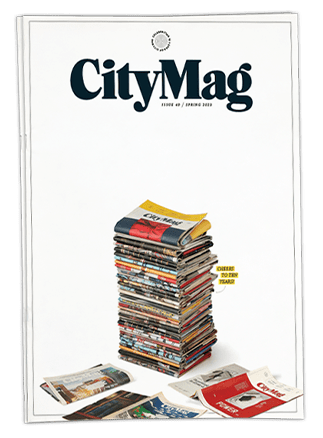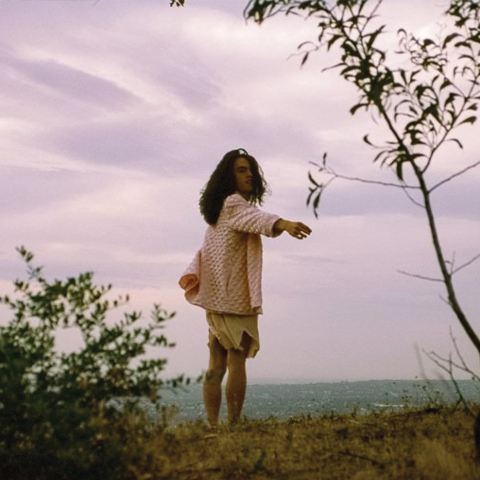From a quiet Adelaide suburb, bedroom producer Lonelyspeck explains how the internet helped them forge working relationships with Grammy-nominated British metalcore outfit Bring Me the Horizon and Australia’s east coast vanguard of experimental music-makers.
Lonelyspeck only needs good wifi to make gold
In very millennial fashion, we got wind that multi-disciplinary musician and artist Lonelyspeck worked on the latest single by metal core behemoth Bring Me the Horizon, ‘LosT’, via Twitter. And in further millennial fashion, to uncover how the hell this international relationship began, we immediately DM’d Lonelyspeck on Instagram with queries.
Lonelyspeck – real name Sione Teumohenga – answers our scheduled Zoom call. Their face, surrounded by thick shoulder-length hair, is the only thing visible on-screen.
They are amid a shadowy, indiscernible mass, which we guess is their bedroom or office. Sione explains: “I’ve got the background blur on”.
This article first appeared in our 10 Years of CityMag, Spring 2023 edition, which is on streets now.

Although the blur is designed to hide the backdrop from view, it works as a symbol of the Lonelyspeck musical sound, catalysed by the recent speaker-blowing release, Abyssal Body.
The EP’s six tracks contains gentle but clear emo-electronic flavours, compounded by glassy and delicate vocals that are cut with muddy and distorted nu-metal textures, such as big guitar distortions and drops.
Sione says they struck up a working relationship with Bring Me The Horizon (BMTH) in 2021 when they produced the single ‘SALT’ for Sydney alt-electronic vixen daine. BMTH’s lead singer Oliver Sykes provided one half of the call and response vocals for the screamo, hyper-pop love ballad, and according to an article by cult music magazine Upset, this was another working relationship forged online.
“He messaged me on Instagram and was like, ‘Do you wanna do a song?’,” daine says in the article.
From ‘SALT’, Sione continued speaking to BMTH’s main producers, Oli and keyboardist Jordan Fish, on Instagram, Whatsapp and Zoom to see if other production opportunities could bear fruit.
“It turned out like, at that time, [Oli had] already been listening to my music,” Sione says, smiling.
“Apparently, they were listening to my song ‘Drown’ and were trying to figure out the guitar sound, and the song ‘WIERDO’ that we did with Hearteyes and Cookii, he often mentions that song.
“And they were referencing [my music] apparently for songs. We kept talking and he would send me stuff saying ‘I wanted to work on it’ and this was the first thing that probably came together like that.”
The most recent example of this successful working relationship is ‘LosT’ – clocking in almost 40 million Spotify streams at time of writing – which is a tear-streaked, hard rock, pop bop released in May.
Lyrically exploring the efficacy of mental health treatments, drugs and belonging writ large, the single contains all the staples of the BMTH brand: an accessible melody, heavy breakdown and ear-splitting vocals. But it also blends maximalist flavours reminiscent of hyperpop, particularly in the snippet of Lonelyspeck’s opening synth riff.

This picture by Jonno Revanche
“I did the lead synth line in the start, and then some sound design effects and stuff through the verse,” Sione says.
“And I actually did a whole bunch more stuff, but… there wasn’t time and they were mixing. I had this different breakdown part in the bridge, and I like worked on that, but then they changed that section.”
Working with BMTH has been a “full circle” moment for Sione: a former scene kid who saw the five-piece perform at Soundwave in 2010.
They remember punters in the festival mosh pit kicking up dust clouds while running around in tight circle pits, “and the band did the thing where they get everyone to get on the ground,” Sione says, referencing the famous ‘jump the fuck up’ metal move created by Slipknot.
“When I was getting into metalcore and heavier, screamier stuff, BMTH were definitely one of the bands that put me on that path,” Sione says.
Outside of BMTH, Lonelyspeck has collaborated with Australia’s next wave of alt-electronic, DIY hit-makers, including Cookii, Hearteyes and the aforementioned daine. Since 2021, Sione has also been represented by national label Coalesce, a subsidiary of Melbourne Label Good Manners, which looks after some of the country’s experimental music forerunners.

It has been four years since Lonelyspeck released Abyssal Body, or any solo music for that matter. In that time, their name has appeared on numerous features such as singles ‘METAL FLAKE’ and ‘WEIRDO’, but nothing alone.
When pressed, Sione says an 11-track Lonelyspeck album is slated to be released by mid-late this year. They can’t give too much away, except that it’s sonically a “mix” of their prior catalogue but more “aggressive and upbeat”.
When we ask Sione whether they want to be the next Nile Rodgers or Jack Antanoff-type production savant and help other musicians’ actualise their sound, or just work on their own material, they say they want to balance both.
“I’ve always preferred working alone on my own stuff, but I’ve definitely tried to find a place for collaboration in the way I work, and I’ve gotten more comfortable with [it] and I think in the early days, I didn’t really like doing it,” Sione says.
“I felt like… I wasn’t able to be myself in the collaborations as much, but now I feel like people are coming to me because they want the thing that I do, so I can just do what I do.”
Metal and electronic music seems to be having a moment. The silly and genre-cleaving international duo 100 Gecs are doing it with their own bent; similarly, the experimental nu-metal and electronic collaborators Collarbones with a tongue firmly in cheek. Maybe 2023 is the year for this sonic amalgamation.
For Sione at least, they feel confident within themselves that they can break some rules about what traditionally ‘sounds good’.
“I’d spent years before ‘SALT’ just trying to figure out how to make those textures work together — like amped guitars sound really dull next to bright synths, and electronic drums take up a totally different space in the mix from rock drums,” they say.
“It became a very integrated process and involved breaking a lot of the ‘rules’ I’d learnt about mixing.”




